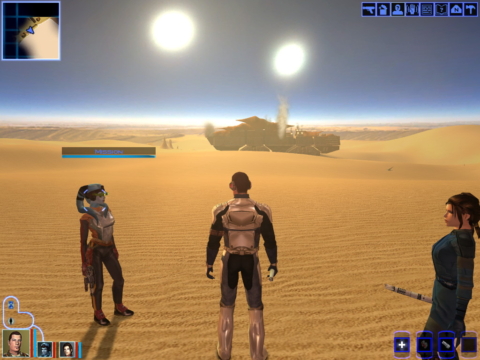
Star Wars: Knights of the Old Republic
Written by: Rik
Date posted: March 21, 2022
- Genre: RPG
- Developed by: Bioware
- Published by: LucasArts
- Year released: 2003
- Our score: 8
What is good Star Wars and what is bad Star Wars has been open to some debate recently, although I don’t think it’s too controversial to say that in general the stock of Lucasfilm and LucasArts was higher in the 90s than the 00s. Not long ago, we took a look at Dark Forces and Jedi Outcast, with the latter review making mention of the abandoned PC version of Obi-Wan, with mutterings about improved quality standards a polite way of saying the game wasn’t very good and PC gamers would have been disappointed with it (as, indeed, was everyone else).
My own sense was that in the 90s LucasArts was fairly judicious in terms of sticking Star Wars on everything and also didn’t tend to release too many crap games in general, but with the release of the prequel film trilogy largely puncturing the sense of anticipation surrounding each and every Star Wars product, the 00s produced a slew of tie-in games that many considered sub-standard, whether they were based on the newer films or the originals.
In the early part of the decade, which we’ll call “the era of trying to pretend that Attack of the Clones was quite good” (more on which, here), LucasArts’ policy seemed to be one of farming out games to/utilising the experience of other developers. (Another example of which from this era, we also covered recently). Among those chosen were RPG stalwarts Bioware, until this point best known for the likes of Baldur’s Gate, and subsequently for Mass Effect, who brought us the first game of its type to be set in the Star Wars universe.
With Baldur’s Gate being a traditional isometric beards-and-swords fest, and Mass Effect a sci-fi space epic that eventually veered towards third-person action territory, it’s hard to look past Knights of the Old Republic as a key part of that transition. That’s the perspective of someone who played Mass Effect first, though, and there’s no real way around that, really, as hard as I might try to judge KOTOR on its own merits. (And I will try!)
Although my friend and colleague recently passed to me the RPG hat of wisdom, I’m not sure my character class can necessarily use it, as despite tentative steps to broaden my horizons bringing with them a rudimentary understanding of RPG genre mechanics, character creation screens and stats contained within still cause pangs of anxiety: should I choose a preselected class, or is that the wimp’s option? If I try to customise, do I know what I’m doing? Will I mess things up for myself in a way that will ruin my enjoyment of the game at some stage?
At the normal difficulty level, at least, the chances of anything being ruined seem fairly minimal here. Googling an old and fondly-remembered title such as this will likely bring up a million suggestions as to how to best enjoy the game (as well as possible spoilers), including some that give the impression that certain choices are of absolute and fundamental importance. I’d recommend you don’t do it: the one thing I would say (and hopefully it isn’t a big spoiler itself) is to bear in mind that this is a game in which the Jedi feature heavily and you’re going to be using a lightsaber at some stage. Otherwise, it’s not as complicated as it might be, despite all of the numbers, and most will be able to work out how to use equipment, weapons and powers to the best advantage of their character and team.
Male or female character player character selected, and we’re whisked back a long time, to a galaxy far, far, away, in which it was still perfectly acceptable for non-Skywalker-saga Star Wars products to use the familiar scrolling crawl. KOTOR is apparently set 4,000 years before the events of the films, although this seems mainly to serve as an easy get-out from anything that might interfere with the main timeline, as many recognisable locations and bits of technology appear apparently unimpeded by the ancient setting.
The tale is also a familiar one, of good vs. evil, and more specifically of the Galactic Republic, the Jedi, and the Sith. Your character awakens on a Republic ship under attack and is immediately subjected to a basic tutorial from a friendly character, the pace of which is at odds with the urgency of the situation, as your new companion patiently offers you guidance on how to look around, open a nearby chest, and put on some clothes, all while the ship is seemingly about to disintegrate.
Despite starting off on Xbox, on PC, Knights of the Old Republic is strictly a mouse and keys affair. Despite appearances, it’s also more clicky-RPG than third-person action. Combat brings an automatic pause in proceedings, allowing you to select and queue instructions while paused, before your character carries them out in real time. Left to their own devices, any member of your squad will carry out a basic attack, but any more complicated moves require your direct instruction and guidance. Being able to pause the game again at any point to issue or cancel instructions works well, as does being able to take direct control of any of your party and move them out of the way if they seem to be having some trouble.
This party at first only includes New Republic Captain Carth Onasi, whom you meet later in the tutorial. If he sounds familiar to those who’ve played Mass Effect, that’s because he’s played by the same actor responsible for Commander Shepard’s pal Kaidan Alenko. And like Kaidan, Carth starts off as a solid lieutenant-type character, who acts as a moral compass out in the game world, but soon becomes extremely needy and starts wanting to talk about his trust issues at some length. Later, you also come into contact with plenty of Jedi, none of whom do very much to undermine their well-deserved reputation for being pompous windbags whose behaviour and code seems designed to lead to the inevitable alienation of eager young Padawans, with disastrous consequences.
All of that said, the acting is of generally decent quality, and KOTOR furnishes you with a good variety of skills and personalities as you recruit friendly characters. You can choose two to accompany you at any one time, with some flexibility to change them up on the fly, as long as you’re not heavily embroiled in an active quest. Taking control of them directly means you can also make use of their non-combat skills – in stealth, or demolition, or computers – if your own expertise lies elsewhere.
Such things must come to those who wait in RPG-land, of course, and the first couple of hours are characterised by slight information overload and the feeling that you’re making progress despite not really knowing what’s going on, or what you’re doing. It’s a few more hours still before things really get going, with the action until that point restricted to doing chores on one planet and then another, before opening up to give you a certain level of freedom and choice.
In this, and many other respects, it is hard to avoid making comparisons to Mass Effect, as the similarities seem to extend everywhere from fundamentals like the game’s mission structure down to smaller details such as the map screen and the selection of extremely silly visors and headsets. (By some funny coincidence, 00s flava sava beards just happened to also be popular in the Old Republic, and when combined with particularly iffy headgear, your hero may or may not resemble a nightclub DJ suspected of murder in an episode of CSI: New York).
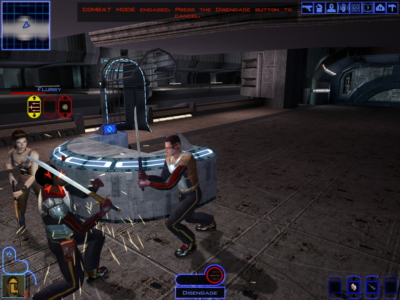
You don’t get the laser sword until you have received the proper training. In the meantime you can clunk around with one of these.
At times, I was possibly more interested in the Mass Effect parallels than actual Star Wars stuff, especially at the outset, and I’m afraid to say that I occasionally found myself skipping through or not selecting dialogue that may have filled in some gaps in ancient SW lore if they didn’t also lead to quests or vital information. I even came to see light side and dark side Force choices in terms of ME’s Paragon and Renegade options, particularly as neither game offers a compelling reason to choose the latter, aside from bare curiosity, or the desire to behave like a sociopath.
That’s a bit of a shame, really, because elsewhere there are characters in Knights of the Old Republic who make a good case for doubting the wisdom and actions of light side Jedi, as well as making more detailed and plausible arguments for the merits of the so-called quick and easy path than is usual. But none of this ever translates to your own choices, and there are rarely any tangible benefits to dark side options that mean you save yourself some busywork. So it all comes down to being a bastard for the sake of it.
I must also admit that I didn’t find the story quite as involving without your own character’s lines being voiced: you just click your chosen answer and hear how others respond to you. All part of the RPG tradition, of course, and it allows you to be your own person rather than just generic male or female Shepard, but it was another factor that occasionally set my finger clicking a bit more quickly than it might have (I never usually skip spoken dialogue at all). I also realised I wasn’t speaking to my squad-mates very much when the game prompted me in its not-so-subtle way (‘X seems like he/she wants to say something, perhaps you should talk to him/her’) but I soon got more into the habit of doing so.
Once you’re out and about in the galaxy, there are familiar locations to potentially excite fans of the films (and books), and it would take a hard heart indeed to not be stirred by some of the familiar visual reference points deployed here. (And is there possibly an explanation for one of Rise of Skywalker’s stupidest and widely-derided plot points contained within, too?) We also get a nod to the pod-racing of The Phantom Menace, with optional swoop racing mini-games available on some planets to earn money. There’s also a card game called Pazaak, although in this case my duty to explore all aspects of the game lost out to my pathological need to avoid playing card games wherever possible.
Optional quests are well integrated and often interesting in themselves, unlike the original Mass Effect‘s planet-based warehouse shoot-outs which felt very secondary. That said, some of the settings themselves can feel a bit warehouse-like, particularly inside buildings, and wandering about can get a little bit tedious at times, despite some occasionally impressive outside scenes. And some of the combat definitely betrays Bioware’s dungeon-slaying origins, as you start a potentially interesting-sounding mission, only to find it a case of hacking through waves of similar baddies in similar corridors. At least that feels genre-appropriate however, where Mass Effect‘s additional battles really felt like padding.
And as your character levels up and unlocks more skills and powers, hacking through enemies does become a lot of fun. Having recently attempted unsuccessfully to impersonate a Jedi Knight in a first-person shooter by swiping ineffectually through Jedi Outcast, here it feels a lot more like the Force is flowing through you. At one point I seemed to hit a sweet spot of crushing enemies with ease while periodically being consulted by NPCs as a wise and powerful Jedi that scratched that particular Star Wars itch in a way I hadn’t quite experienced before.
Elsewhere, there are numerous other ‘happy lights’ moments, from being sent to the gunnery of a Millennium Falcon style ship to ward off incoming enemy fighters (that may or may not be coming in too fast) to the sinking feeling of being drawn in by an enemy tractor beam, and a finale that involves a big space battle raging while a small band of goodies beam onto a big superweapon and try to shut it down. In the age of The Trade Federation, midi-chlorians and fist-chewingly awkward romantic dialogue, no wonder KOTOR came as some relief for 00s Star Wars fans.
Quite by accident, I seem to be systematically covering a whole host of games that have been (or are due to be) remade at the moment, and so I must again register my slight befuddlement here that they’re doing a new version of this game, instead of developing a new instalment, or considering one of the many other possibilities afforded by the license. In a world where such things are deemed necessary and desirable, there are also inevitably those who insist that the old game is bugged and/or unplayable without modding and extended tinkering.
Without wanting to appear unduly pious or ideologically predisposed to a certain course of action, I generally take such perspectives with a pinch of salt, purely because I can procrastinate well enough on my own without being invited to endlessly fanny around with things before I even start. And though I did experience some glitches, like occasionally dropping to the desktop during video sequences, the player character running on the spot, or NPCs getting stuck in the background during dialogue scenes, it was all basically fine. Technically, it stands up pretty well in my view: 1024×768 was fine by me, with the only slightly raggedy bits being the pre-rendered video sequences, which are pretty infrequent anyway. Those who do like to patch and tinker will certainly find some options out there.
Once again at FFG towers, we’ve managed to come at things in the wrong order and at the wrong angle, and I can only apologise for viewing KOTOR through a slightly Mass Effect-centric lens. But it’s surely all part of the fun of things to stumble into a game and then be able to start exploring backwards through the developer’s timeline as well as forwards. (Surely even the most hardcore gamers out there don’t insist you go back to Pong to ensure you play and experience everything in the correct chronological order). Anyway, despite some annoyances and foibles, KOTOR remains a pretty good time in its 2003 PC form, and stands up well to at least the first Mass Effect game, despite being several years and a whole console generation older.

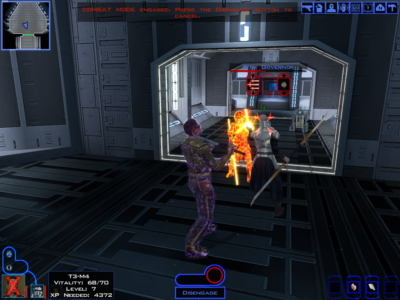
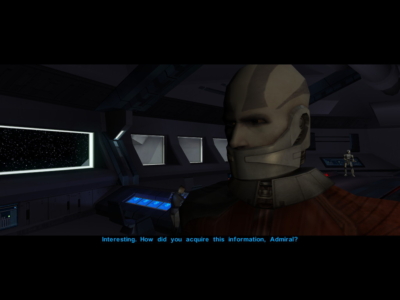
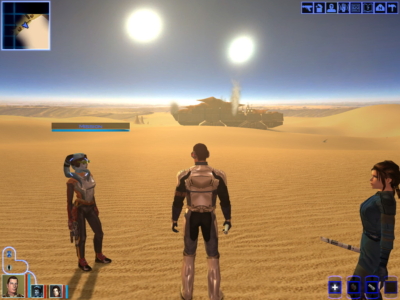
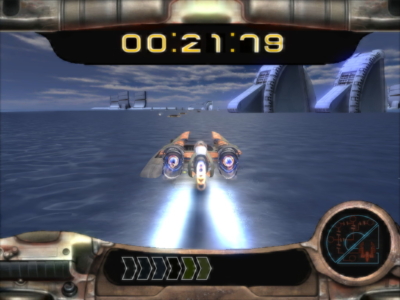
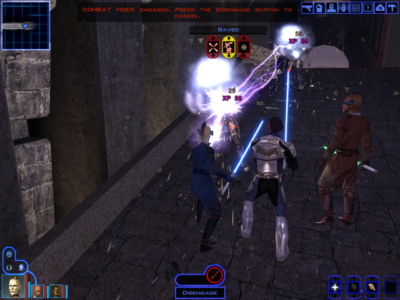

 Posts
Posts
Did THE BIG SURPRISE get you, or did you find it a bit telegraphed these days?
March 21, 2022 @ 2:32 pm
I accidentally saw something that I thought might have been a big reveal (either via Twitter or on the Steam page) but it turns out, that wasn’t it.
So I thought I knew what it was and that I could see it coming, but I didn’t, and couldn’t.
Not to get too cryptic! But, yeah, I thought it was quite good!
March 21, 2022 @ 3:10 pm
I also avoid playing card game minigames whenever I can.
And yes it’s interesting how it’s such a clear intermediate step between the 2d Bioware games and Mass Effect. It’s also interesting how Obsidian were contracted to build a sequel that was generally seen as superior (though rougher around the edges as well) just like with Fallout New Vegas
March 23, 2022 @ 10:23 pm
I avoid playing cards in real life, too! (Due to general incompetence, not a gambling problem).
Hoping to get my thoughts down on the sequel in the not-too-distant future.
March 24, 2022 @ 12:43 pm